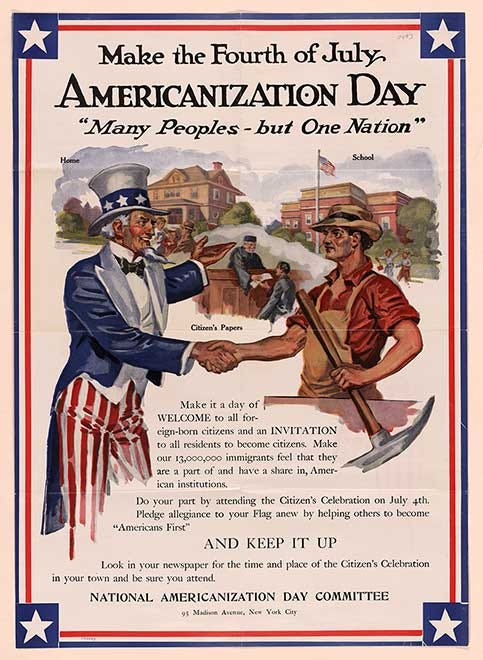
Quotes from Alex Carey’s book - Taking the Risk Out of Democracy
“What started as a method of controlling the political opinion of immigrant workers quickly turned into a massive program for controlling the thinking of an entire population.
One of the most startling examples of the escalation of the whole population in the processes of propaganda was how the Americanization program (a word which conjures up the ‘thought police’) came to be transformed into a national celebration day for the fourth of July. To many of us it comes as a shock to discover that American Independence Day had its beginnings in a business-led program to control public opinion, rather than as the direct expression of a nation celebrating its historical birth.” - From foreward by Noam Chomsky page 4
Further in the book there is a lot more detail about what happened, including this quote that’s taken from page 60 as an example :
[…]
“During 1918 the CPI set up fourteen foreign-language bureaus and made them responsible for developing, among their people, Americanization sentiment and support for the war. These bureaus were so successful that 745 foreign-language newspapers co-operated out of a total of 865. In addition, it was the foreign-language bureaus which were largely responsible for the petition presented to President Wilson on 21 May 1918, asking that the fourth of July be especially recognized as a day for the foreign-born to demonstrate their loyalty to their adopted country. Wilson agreed. With the President’s stamp of approval the CPI set to work to plan an enthusiastic celebration for what was to be called Independence Day.The amendment to ‘Independence Day’ rather than the ‘Americanization Day’ as originally proposed in 1915 by the NAC is an interesting change. It could be argued that the cultural and ethnic intolerances inherent in the term ‘Americanization’ were too obvious in 1918 to engender overwhelming public support for a national celebration. ‘Independence Day’, while less obviously ethnocentric, does, however, suffer from a certain ambiguity. Within its historical context ‘Independence Day’ refers to both an immigrant’s separation from old cultural ties and their alienation from the new business-oriented American culture. Current Independence Day celebrations still contain the residual power and meaning of these historically dislocating circumstances, even though most people would think of the day as a celebration for national rather than ethnic independence.
The Bureau of Naturalisation also continued its Americanization efforts during 1918, especially with respect to schools. It reported that Americanization committees had been organized in virtually all US communities, that chambers of commerce were widely active and that scarcely a commercial or business organization in the nation was not represented in some way in support of the bureau’s efforts. Churches in many areas had also organized programs for Americanization. The bureau continued to sponsor Americanization classes in industrial plants and influenced the city of Chicago to provide a thousand teachers for such work. Overall the bureau did all in its power to preach the gospel for a full red-blooded American campaign of Americanization.”
[…]
While on the subject of lesser known history and celebration - “Star Spangled Banner” US’ National Anthem used an older tune, “To Anacreon…” popular in English pubs, here’s a performance :


